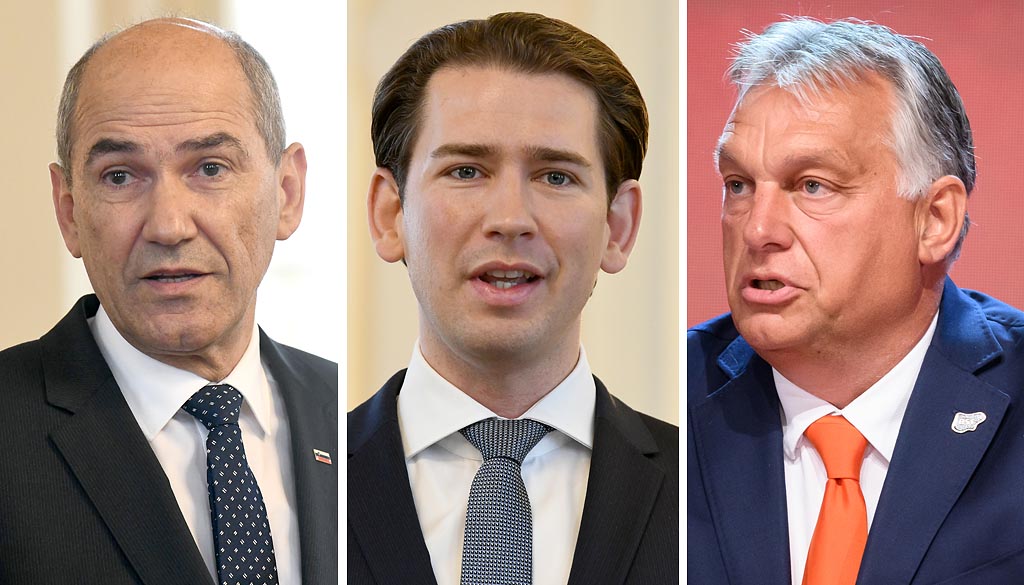By Nina Žoher
The Politico newspaper is obviously primarily concerned with slandering those leaders who are not close to their hearts. After accusing Slovenian Prime Minister Janez Janša of endangering media freedom with unilateral allegations, without specific names and surnames, they have now turned to Austrian Chancellor Sebastian Kurz, who, according to them, is going to wage a media war with media outlets that are not in favour of his government.
Regarding 34-year-old Chancellor Sebastian Kurz, Politico said that he is far from promoting “freedom of expression, political dialogue, and democracy”, as he is putting pressure on the Austrian media through a combination of financial pressure, access control, and direct intimidation. Politico is thus expanding the circle of attacks on leaders outside the countries of Eastern and South-Eastern Europe.
In support of their story, they cite the statement of Helmut Brandstätter, a former member of the Austrian National Council, who was once a journalist. “Kurz does not accept that journalists stand on the other side of the fence and that their job is to verify the facts and report them,” he states, adding that journalists cannot be expected to merely deliver official messages. Anyway, here it is necessary to take into account that he is a member of the opposition party Neos. Otherwise, it is true that they mentioned which party Brandstätter comes from. However, an EU reader, who is not aware of which Austrian parties are in the coalition, does not know exactly what is going on. After all, if we relate to what is happening in our country in the Politico affair, it is more than clear that the opposition is constantly criticising the Prime Minister and accusing him of attacking the media, even though we know that the truth is not exactly like that. Of course, no one claims that the practice is always such that the opposition is wrong, but it is necessary to mention that the reader can form an opinion based on what is written.
Among the illiberal countries is now also a democratic Austria
“It is a similar scenario that self-proclaimed ‘illiberal democrats’ have been relying on in recent years – from Poland to Hungary, Slovenia and the Czech Republic – to undermine critical media,” Politico said, adding that since the war, Austria has been anchored in the liberal political traditions of Western Europe, and its democracy underpinned by a vibrant press. Apparently, they believe that Kurz even took care of the authoritarian turn in the country, as they wonder if history will make the Alpine country more resistant to the authoritarian turn. At the same time, they state as problematic that this year Austria recorded the lowest ranking on the annual scale of media freedom.
They go on to write that Kurz’s government is very generous with money to those media outlets that report in its favour. This was supported by a statement by Milan Nič, who leads research on Central and Eastern Europe at the German Council on Foreign Relations, the Berlin Brain Trust, and stated the following: “These cash flows remind me of the early years of the (Hungarian) Fidesz government. Such tactics, common in the region, emerge in the spirit of ‘if something is not forbidden, it is allowed.’” They further state that Kurz’s office declined to comment on the content of the article. “But last week, on World Press Day, Kurz tweeted that freedom of the press and independent media were ‘important pillars of our liberal democracy,’” they added critically. At this point, we must remember that in the case of Lili Brayer, who poked her nose into Janša’s business, we could see very well how they can ignore the official explanation at Politico if it is not in line with their story.
Regarding the state radio and television at ORF, they state that the journalists who work there are facing persistent interference by the Kurz government in reporting. “Many fear that Kurz will use the upcoming elections to appoint a new director of the ORF, through the board of governors,” they said, adding that one of the journalists (without name and surname) said that there had been critical periods in the past, however, it has never been as bad as it is now.
Judging by what has been written, Politico is more than obvious not okay that Kurz was rewarded a prize that recognises his role in ensuring freedom of reporting. He was awarded the “Media Freedom Award 2021” in Germany on Tuesday, acknowledging that he represents the builder of the East-West bridge. “He is always committed to the absence of first or second class Member States in the European Union,” they said in a key statement. The latter is especially true if we recall how in mid-March Kurz advocated for a fair distribution of vaccines in the European Union, i.e. in terms of population. He backed this up with a critical statement that the unequal distribution of vaccines and the associated vaccination are causing tensions in the European Union.
Considering that Bayer’s article slandered the Slovenian government, saying how it affects the media, it is not surprising that Slovenia was mentioned in this article. Even less surprising is the statement of the Hungarian Prime Minister Orban, as it is known that Politico is allergic to him. In March, they criticised Hungary and their organisation of vaccinations. As usual, of course, they again raved past the facts and wrote that vaccination in Hungary was at an extremely low level, although in reality it was faster than in many other EU member states.

